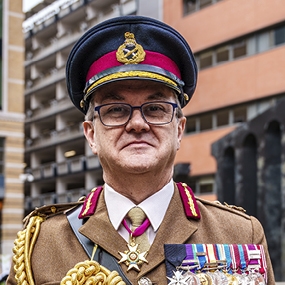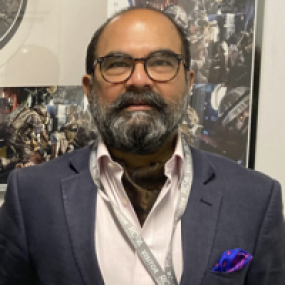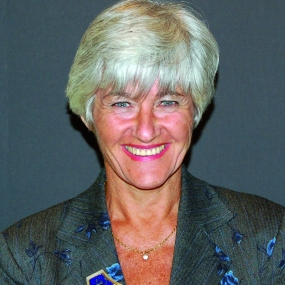Is War Good for Medicine? A mini series in 3 parts
This podcast is part of a mini series of 3, looking at how military medicine has transferred to civilian practice and vice versa. Each part has been recorded as a stand alone episode so you can listen to them in any order you like.
Join the outgoing Surgeon General, Major Tim Hodgetts, Professor and Retired Colonel, Peter Mahoney and Retired Colonel 'Jag' Jagdish as they reflect on their experiences with Dr Anna Maria Rollin as they look at three things, the Process and the Process Zoo, Motivation and Innovation and Challenging the Protocol.

Major General Tim Hodgetts is a strategic international leader in military medicine, widely known for his innovative contributions to both civilian and military healthcare. With a career spanning over 40 years, Tim has embraced being a clinician, teacher, inventor, researcher, author and war poet. He has continuously held honorary professorships since 1998 in the United Kingdom, South Africa, and Serbia and he was the inaugural Defence Professor at the Royal College of Emergency Medicine.
Tim has served on multiple overseas operations as an emergency medicine consultant, helicopter doctor, and field hospital medical director. His leadership roles have included Head of the Army Medical Services (during the COVID-19 pandemic) and Commissioner at the Royal Hospital Chelsea. His military career culminated in his appointment as the Surgeon General of the UK Armed Forces, and separately as the elected Chair of the Committee of Chiefs of Military Medical Services in NATO—the senior medical advisor to the NATO Alliance. In 2016 he co-founded the charity citizenAID, serving as the first Chair of Trustees; he is also a Trustee of The Poppy Factory and London’s Air Ambulance charities, and Patron of Style for Soldiers.
With a passion for innovation, Tim created his own ‘Toolset for Innovation and Change’, that provides a transferable framework to solve complex problems and improve failing systems. He has received numerous honours and awards including appointment as Companion of the Order of the Bath, Commander of the British Empire, and Honorary Surgeon to his Majesty the King. Tim’s international impact is reflected in his receipt of the Order of Military Medical Merit from the United States Army, and the Defence Medal for Meritorious Service from Denmark. During his illustrious career, he has authored over 30 books and published more than 150 academic papers. Tim was recognised across the National Health Service as ‘Hospital Doctor of the Year’. The British Medical Association named him ‘one of the most innovative doctors in the country’.
A book of his original war poetry “Frontlines and Lifelines”, in support of The Poppy Factory, was published on 12 August 2024 and was launched in a performance at The Edinburgh Fringe.

Peter was appointed as the foundation Defence Professor of Anaesthesia & Critical Care in 2008. He established the academic department and encouraged individuals to undertake research and higher degrees.
He deployed actively to ensure that research was closely linked with the needs of the operational military and was awarded the OBE, a QCVS and the US Military Bronze Star. He was promoted to CBE in 2015, became Emeritus Professor in 2016 and undertook ballistic research at Cranfield University. He moved across to Reserve Service in 2020 retiring from the reserves in 2022.
Current academic appointments include Visiting Chairs at Imperial College London (Centre for Blast Injury Studies) and Cranfield University
He also works in the independent film industry as an Executive Producer and fight coordinator having gained instructor qualifications in Filipino Martial Arts.

Colonel (Retired) Soundararajan ‘Jag’ Jagdish served in the Defence Medical Services for nearly thirty years during which he deployed extensively including the two Gulf conflicts, the Balkans, Sierra Leone and Afghanistan.
With one of his subspecialty interests being chronic pain management, he had the privilege of helping personnel recovering from complex injuries.
He served as Chief of Staff, Defence Anaesthesia during the years of sustained high intensity military operations and, as a newly minted MBA, helped rationalise the supply chain and speed up the timely procurement of capital anaesthesia, critical care and pain management equipment. In retirement, ‘Jag’ is an independent medical history researcher with an MA (Research) in Military History and has authored various papers and presentations. He is currently the President of the Medical Society of London in its 250th year.

Maria worked in the NHS throughout her professional career and spent 34 years as a consultant anaesthetist at Epsom General Hospital.
She was a Member of Council of the Royal College of Anaesthetists, and ultimately Senior Vice-President. Thereafter, she held the post of Clinical Quality Adviser to the College. She is currently Chair of the Heritage and Archives Committee at the College.
She has always had an interest in patient information and patient safety, and worked as a GMC Associate until 2022.
Most of her publications have been concerned with standard setting, quality assurance and safety and she is the author or co-author of several national guidelines.
Books:
Major General Tim Hodgetts "Frontlines and Lifelines - An Army Doctor in Crisis and War" Unicorn Publishing ISBN: ISBN: 9781916846319
Marwick, Arthur. "The impact of the First World War on British society." Journal of Contemporary History 3.1 (1968): 51-63.
Hudson, Geoffrey L. British Military and Naval Medicine, 1600-1830. Vol. 81. BRILL, 2015.
Carden-Coyne, Ana. The politics of wounds: Military patients and medical power in the First World War. Oxford University Press, 2014.
Cantlie, Neil. A history of the Army Medical Department. Vol. 1 & 2. 1974.
Kragh Jr, John F., et al. "Tragedy into drama: an American history of tourniquet use in the current war." Journal of Special Operations Medicine 13.3 (2013): 5-25.
Memorandum on the Treatment of Injuries in War - Based On Experience of the Present Campaign, July 1915. Edited by Lt-General A. T. Sloggett, Director General, British Army Medical Services in the Field. H.M.S.O., London, 1915.
"A Heavy Reckoning: War, Medicine and Survival in Afghanistan and Beyond" - Dr Emily Mayhew
"Combat Anaesthesia: The First 24 Hours" - Chester Buckenmaier III, Professor Peter F Mahoney, Sam Fort, Houston TX, Office of the Surgeon General, Borden Institute, 2016
"The Medical War: British military medicine in the First World War" - Mark Harrison
"Medicine and victory: British military medicine in the Second World War" - Mark Harrison
Papers:
1. Roberts, M.J, & Jagdish, S. A history of intravenous anesthesia in war (1656-1988). Journal of Anesthesia History, 2(1), 13-21. 2016.
2. Roberts, Matthew J. The development of intensive care in the military environment. Journal of Anesthesia History, 2(4), 133-141. 2016.
Website articles:
The Influence of Two World Wars by Anne Thornberry
The image accompanying this podcast has been reproduced with the kind permission of Marco di Lauro http://www.marcodilauro.com
If you have any queries about this podcast please contact us at archives@rcoa.ac.uk
